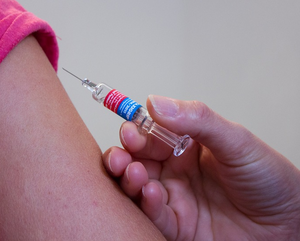Vaccination
Contents
Key Stage 4
Meaning
A vaccine is a medicine which prevents a future infection by a pathogen.
About Vaccination
- Vaccination can also be referred to as 'inoculation' and 'immunisation'.
- Vaccination allows an organism to become resistant to an infection before being infected.
- To vaccinate an organism a weakened, inert or similar, but less deadly, form of the pathogen is injected into the organism. This allows the immune system to create antibodies to fight the infection so that when the organism is infected by the active version of the pathogen the immune system already has the antibodies it needs to destroy it.
Examples
- Infecting people with Cow Pox virus prevents an organism from getting Small Pox virus.
- Injecting samples of a weakened version of the Tuberculosis bacterium reduces the chance of infection by 20% and of symptoms developing by 60%.
Extra Information
References
AQA
- Vaccination, pages 42, 47, GCSE Combined Science; The Revision Guide, CGP, AQA
- Vaccination, pages 48, 50, GCSE Biology; The Revision Guide, CGP, AQA
- Vaccination, pages 87-8, 94, GCSE Combined Science Trilogy 1, Hodder, AQA
- Vaccination, pages 89, 96, GCSE Biology, Hodder, AQA
- Vaccination, vaccine, pages 129, 136-7, 139, 142, 154-5, GCSE Biology; Student Book, Collins, AQA
- Vaccinations, pages 132, 133, GCSE Combined Science Trilogy; Biology, CGP, AQA
- Vaccinations, pages 138, 139, GCSE Biology, CGP, AQA
